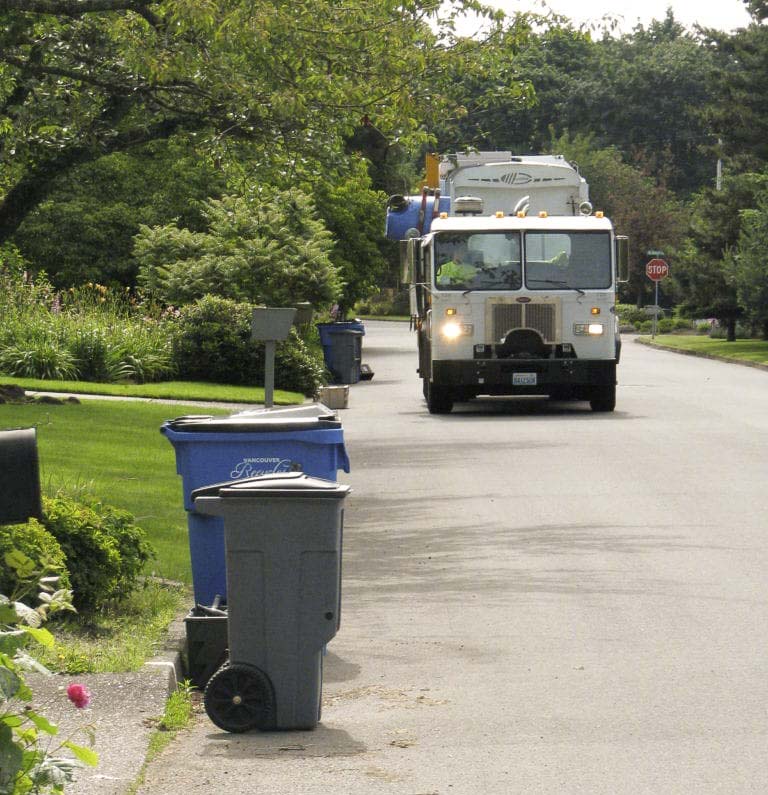These increases are requested due to new restrictions on recycling by China and other processors
CLARK COUNTY — You can blame China. You can blame your neighbor. Or, if you’re really honest, you can maybe point the finger at yourself. Whomever you decide to blame, it looks like most of us will be paying quite a bit more to recycle soon.
Starting in 2013 China, the world’s largest buyer of recyclable material, began implementing stricter standards on what level of contamination they would accept. In 2017, China stopped importing recyclables from many U.S. companies, leaving them scrambling to find new markets for the materials, and plastics piling up in many processors.

“We’re meeting the contamination levels that China has set, as well as the new markets that we have found, in order to get out more of the materials that shouldn’t be in there, and to generate cleaner recyclables,” says Travis Dutton, Clark County’s Solid Waste Program manager. “That has led Waste Connections to slow down the sort lines … to about half as fast as it was running before.”
Dutton, along with a number of officials from Waste Connections and its affiliate Columbia Resource Company, were at a council work session this week. They are preparing to ask for a rate increase of up to $2.44 per household, per month, in order to help offset the rising costs of dealing with recyclables.
“We’ve lost a little over four million dollars since last October because of this impact,” Jason Hudson, a division vice president with Waste Connections told the council.
“You talk to anyone in this business and we’ve never seen anything like this,” Hudson says. “And this has been pretty stable now for the last six, seven, eight months. So I think this is the new baseline.”
China’s push to control what they take in is just one issue facing waste management companies, says Dutton. “The materials that are coming into our homes are changing faster than we can communicate with our public,” he says. “Plastic is getting thinner, newspaper has gone down as far as being used, glass is not used as frequently as plastic. So there’s a lot of changes that are very hard for both Waste Connections to process and for us to keep up with as far as outreach goes.”
In its early years, curbside recycling was generally seen as a way to not only help the environment, but cut down on the amount of waste going into garbage bins. For many people, that actually meant reducing costs.
“We really hung our hats largely on ‘it costs less than garbage,’ so that was something that we’ve really instructed the public on,” says Dutton. “And, to some extent, that’s not necessarily true. It’s different in different areas, but the cost to recycle to accomplish what we want to accomplish has gotten higher.”
Dutton says they’ve had to slow down their automated sorting machinery, and hire more humans to help pick through recyclables. Dutton adds that the requested rate increase would only offset recent losses, but not help them recover the millions that have been lost since the market changed.
“We think that this isn’t a Waste Connections issue,” says Hudson. “This is something that needs to be ultimately passed down to the customer, and so that’s what we’re asking for your help to figure out a way, and look at this annually. If markets rebound then rates are adjusted back so customers get the benefit if the market turns the other way.”
The council has the power to approve increases to recycling rates, but if they recommended passing the increased costs to garbage customers, statewide approval would be needed.
“I think we’re buying a lot of bad will with that big of a rate increase,” said Councilor Jeanne Stewart.
Councilor Julie Olson said she understands the need for Waste Connections to recoup some of its losses, but wants to make sure that ratepayers fully understand why their bill is going up.
“This is a global issue,” she said. “This is not that Clark County Council wants to raise your rates because of X,Y, and Z. If it’s on a separate line it could be easily explained.”
The proposed rate increase would be in addition to annual increases linked to the Consumer Price Index. Hudson said those have averaged one to three percent annually.
It also wouldn’t address the rising cost of business elsewhere for Waste Connections. Hudson says drivers recently received a raise of $2.50 an hour, part of it as a negotiated increase, and part just to stem the loss of drivers to other companies.
“We lost, I think, 14 drivers in the month of August just because of the opportunities that are out there with a CDL right now,” he said.
The council set Dec. 18 as a date to hold a public hearing on the proposed increases, and asked for better numbers on what ratepayers could expect to see as an overall increase next year.




